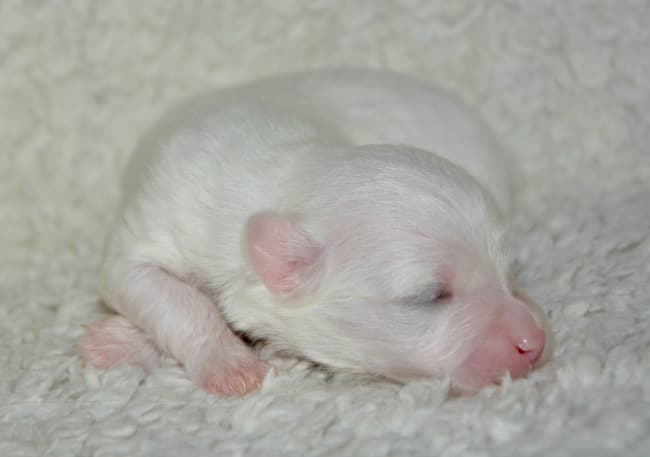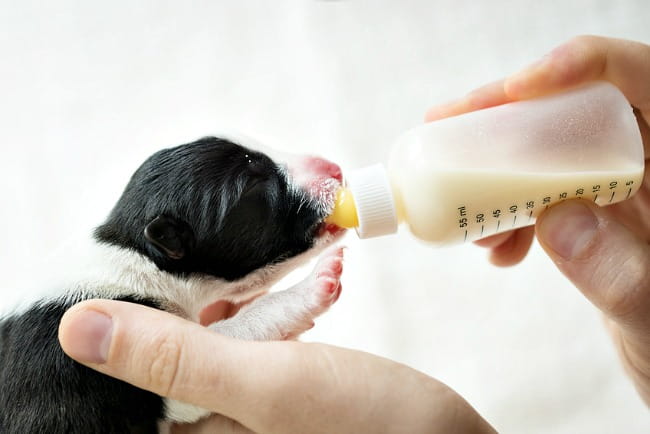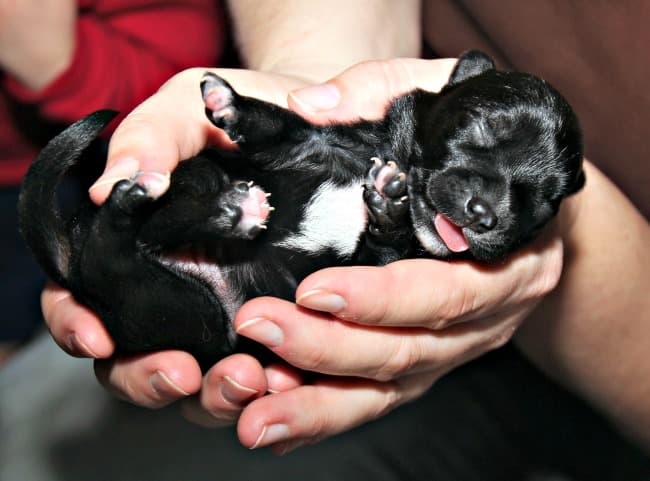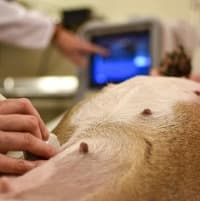FYI: If you buy something through a link on this site I may earn a commission - at NO extra cost to you.
Caring For New Born Puppies
Taking care of new born puppies is time consuming, and it can be worrying, frustrating and tiring... but it can also be a very rewarding and enjoyable experience.
You need to keep them warm, set up a regular feeding schedule, help them to eliminate and keep both the pups and their environment clean.
The good news is that if you do it all right, you can help these very vulnerable little creatures get a head-start on life... and that's a great feeling!
If you've suddenly found yourself in the position of caring for, and feeding, newborn puppies and have no idea what to do, or where to start - take a breath, then check out the tips and advice on this page.

Also, keep in close contact with your own veterinarian as he or she can be a hugely valuable source of help, support and information.
- Environment and Temperature Control for Newborn Puppies
- Bottle Feeding
- Tube Feeding
- Newborn Puppy Weight Gain
- Elimination Assistance
Keep Newborn Puppies Warm
Very young puppies can't regulate their own body temperature, so you need to keep them nice and warm.

A cardboard box, lined with paper towels or puppy pee pads, makes a good 'nest'.
Both these absorbent materials have a bit of texture which makes it easier for the puppies to move around.
Newspaper is okay if you have nothing else handy, but not the best choice. Replace the bedding frequently to keep the nest clean and dry.
Put the box in a draft free area in a room whose temperature is kept between 90 and 95F for the first week. You can lower it to the mid 80's during the second week and then reduce slowly until it is around 70 - 75F by the end of the first month.
A whole litter of new born puppies stay warmer more easily as they tend to sleep together in a puppy pile, benefiting from each others body heat.
A single pup needs more help.
A heat pad/hot water bottle well-wrapped in towels, or a 25 watt lightbulb in a desk lamp, are quite effective.
However, be sure to keep the heated pad/bottle or heat lamp at one end of the box only. That way the puppies can crawl away from the heat if they get too warm.
It's a bit of a juggling act, trying to keep such tiny puppies at the right temperature!
Too cold and they'll start to 'fade', then organ failure can set in followed by death.
Too warm and they can get dehydrated and/or constipated. Too hot and they can overheat and die.
If you have a single puppy to raise it's even more difficult to keep him at the right temperature.

Sometimes carrying him around next to your skin is the best option in the early days.
Obviously this is time consuming,
and awkward at times, but it can make a big difference to a pup.
Always monitor the puppies very carefully and check on them often to make sure that they're not too cold or too hot.
If necessary, you can take the puppies temperatures rectally.
A newborn puppy's temperature will usually be around 94F, and this will change slowly over the first few weeks. By the seond week it will likely be somewhere between 97F and 100F, eventually leveling out between 100F and 102F by the time the puppy is one month old (this is the average normal temperature for a dog).
fading puppy syndrome
Sometimes newborn puppies who aren't being nursed by their mommas can develop something called Fading Puppy Syndrome. This usually shows up somewhere between birth and three weeks, but can occasionally happen later. There are a variety of reasons for it including lack of colostrum (because puppies are not nursing), low blood sugar, getting chilled, constipation, injury or health condition, and infection.
The main signs of Fading Puppy Syndrome include:
- Lethargy
- Weakness
- Weight loss (or inability to gain weight)
- Distressed vocalizations
- Disorientation and isolation
If you have a puppy who shows any of these signs and isn't thriving it's very important to get in touch with your veterinarian for advice and help. meanwhile you must keep the puppy warm, feed frequently (it's worth remembering that puppies lose heat while feeding as they use a lot of energy to do it, so extra attention to warming is required after feeds).
Although some puppies with fading puppy syndrome won't rally regardless of what you do to help them, there are also many successes. I'd also recommend DogZymes Fading Puppy Support supplement which is a blend of electrolytes, probiotics, enzymes and proteins. It can give a struggling puppy the extra help it needs.
Bottle Feeding New Born Puppies
Bottle feeding tiny puppies can seem a little scary at first, but it's not as difficult as you might think and most puppies take to the bottle fairly quickly.
You will need to have the right milk and other paraphernalia on hand, and new born puppies are like newborn human babies, they need to eat OFTEN (probably every couple of hours to begin with).
It can be exhausting at first, but will soon become second-nature. Bottle feeding and hand raising a newborn puppy is a very satisfying (and sometimes nerve-wracking) experience.
Check out my How To Bottle Feed Puppies page to learn exactly how to make sure your little ones get the nutrition they need to grow up healthy and strong.

Tube Feeding Puppies
Newborn puppies who are very weak, or who have difficulty sucking, may need to be tube fed.
However this can be tricky and you'll need your vet's help to get started.
If you thread the tube down into the puppy's lungs rather than into his tummy, he will die, so it's important that you're shown how to tube feed properly by a veterinarian.
Although it's an effective way to make sure a puppy gets the right amount of milk, tube fed puppies can miss out on the social interaction and cuddling that accompanies natural nursing or bottle feeding.
For both the above reasons it's best not to use this as a first-choice when you need to feed new born puppies, only as a method to be followed when all else fails.
This video shows how to tube feed a puppy, you can also find out more about this on my bottle feeding page (see link above) but PLEASE do get some hands-on help from your veterinarian before you try this yourself.
New Born Puppy Weight Gain
A new born puppy who is gaining weight will look 'chubby or rounded', will feel soft and warm, and will either be eating or sleeping!
Although you can usually tell if new born puppies are gaining weight just be their appearance, it's always nice to know that they are 'on track'.
There's a huge variation in size and weight between a tiny/toy breed pup and a large/giant breed pup. Their puppy growth rate is also different and there is no 'one-size-fits-all' method of calculating puppy weight estimates.
However, there are some general 'rules' about the amount of weight a newborn puppy should gain, and the rate of his development.
In the first 24 hours after birth a pup may lose a little weight, but then a healthy puppy will see a steady increase.
As a 'rule of thumb' newborn puppies should double their birth weight within the first 7 to 10 days. From then until the puppy is about six weeks old you can expect to see something in the range of a 5% - 10% weight gain per day.
You can find more information on how to decide if your puppy is within the 'normal' range when it comes to growth and weight gain, and even get an idea of just how big he will get by checking out my Puppy Weight Chart page.
New Born Puppies Need Help Eliminating
Very young puppies can't pee or poop without help. Their mom would normally stimulate the muscles required to control these functions, by licking her pups' anal areas.

If you're hand raising puppies, you
will need to mimic this behavior by gently rubbing the same area with a
damp cotton ball or soft, damp cloth after every feed.
Most puppies develop the ability to perform these bodily functions independently somewhere between 3 and 4 weeks of age.
When bottle feeding new born puppies, look for stools that are brown in color (anywhere from pale to dark shades) and semi-formed.
If the stools seem very hard or dry, or are difficult to pass, feed more often and, if necessary, dilute the formula with a bit more water than normal.
If that doesn't help and a pup seems truly constipated, ask your vet for advice as he may need an enema or some medication.
DO NOT try to take care of it by yourself or give him over-the-counter or 'human' products!
If your newborn puppies are passing stools that are green/yellow, or show signs of blood, infection is a possibility and you need to contact your veterinarian for advice.
Final Thoughts......
If you find that you have new born puppies to take care of by yourself, don't panic!
Many, many breeders and dog lovers have
successfully hand raised puppies, and you can do it too.
Use the above information as a general guideline to what's required of you, but always WORK WITH YOUR VETERINARIAN, and follow his/her instructions, advice and recommendations at all times.
It's always better to be safe than sorry when dealing with such tiny, delicate creatures as new born puppies. So, if you're in doubt or concerned about anything during this time, talk to your vet.
Once your puppies are weaned and getting ready to go to their new homes, be sure to get them treated for worms (pretty much all puppies have worms to begin with!), and start on their scheduled vaccinations.
It's also a good idea to familiarize yourself with the signs and symptoms of the most common dog illnesses so that you can protect your precious new pups.
Please do remember, that I don't intend to, neither am I able to, replace your veterinarian in terms of health care advice, diagnosis or treatment of new born puppies!
Here are a few excellent books that go into great detail about whelping (birthing) puppies and how to take care of both the momma dog and the newborns themselves.
I'd recommend having one of these to hand if your dog is pregnant......
- Puppy Intensive Care - A Breeders Guide to Care of Newborn Puppies
- The Whelping and Rearing of Puppies
- Hand Rearing of Newborn Puppies
- Advance Canine Reproduction and Puppy Care
you might also like...
- Home
- Puppy Health Care
- New Born Puppies
FTC Disclosure: Some pages on this site contain affiliate links. I may earn on qualified purchases.





